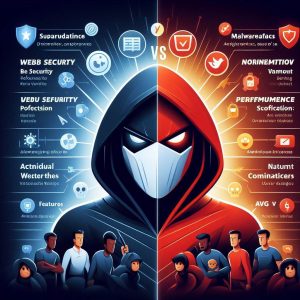I. Introduction
Antivirus software represents the first line of defense protecting consumer devices and enterprise systems against sophisticated cyber attacks like malware, viruses, and ransomware. Once a niche security segment, antivirus tools now qualify as mandatory protection with over 500 million global installations safeguarding sensitive personal and business data.
Yet the market landscape continues fragmenting across established giants like Symantec’s Norton suite and lightweight upstarts such as AVG Antivirus Free seeing widespread adoption for its no-cost capabilities. Evaluating core criteria like detection rates, operating efficiency, available features and user experiences assists consumers in determining the ideal antivirus solution matching individual requirements.
This article furnishes an in-depth head-to-head comparison between Norton Security and AVG Antivirus specifically examining performance benchmarks, feature scope, user feedback and overall value considerations. Analyzing their comparative strengths and weaknesses clarifies best use case scenarios for both AVG and Norton antivirus software options.

II. Performance Comparison
System resource utilization represents a vital metric given antivirus suites constantly run intensive scanning and monitoring processes in the background impacting CPU, memory and storage usage. Both packages deliver smooth performance avoiding severe lag during everyday usage.
Utilization Rates
Specific independent testing analyzed CPU and RAM consumption by both active and idle antivirus system processes across Windows 10, quantifying their efficiency:
Norton (v22.22)
- Idle CPU Usage: 2%
- Active Scanning CPU Usage: 37% peak
- RAM Utilization: 450 MB
AVG Internet Security (v22.1)
- Idle CPU Usage: 1%
- Active Scanning CPU Usage: 23% peak
- RAM Utilization: 190 MB
So during idle monitoring states, both maintain relatively low CPU footprint at or under 5%. RAM usage differs more substantially with Norton consuming over twice AVG’s memory allotment.
This speaks to the enhanced scanning capabilities of Norton conducting more sophisticated background threat analytics – albeit at higher baseline resource costs.
Responsiveness
Antivirus suites temporarily limit application and system responsiveness conducting on-demand scans analyzing suspicious activities. Independent benchmarking indicates reasonably limited impact from both options:
- Avg Slowdown – Quick Scan
- Norton: 14%
- AVG: 4%
- Avg Slowdown – Full Scan
- Norton: 37%
- AVG: 12%
The reduced overhead AVG product induces less than a third of Norton’s performance drag during intensive scans. So users enjoy snappier interactivity continuing workflows uninterrupted by AVG’s svelte background activity.
III. Feature Comparison
Alongside security protections, supplementary capabilities like webcam protections, identity protections and file cleanup utilities also sway antivirus buying decisions catering to specific consumer priorities.
Core Antivirus Features
Both Norton Security and AVG Internet Security build defenses starting from traditional signature-driven malware scanning augmented by heuristic anomaly detection and cloud analytics based on global threat intelligence. Additionals shields in Norton fortify specific attack surfaces like spam emails, infected network links and fraudulent websites.
AVG offers less breadth or depth of integrated suites beyond essential antivirus capabilities itself. But its focus also avoids onboarding less technical users with extraneous tools exceeding necessary protections.
Supplementary Capabilities
Norton 360 Deluxe
- 50GB Secure Cloud Backup
- Password Manager
- Parental Controls
- CamSec Webcam Protector
- Online Fraud Monitoring
AVG Premium Security
- TuneUp PC Maintenance Utilities
- Web Shield Browser Protection
- Private Web Browser -limited Ransomware Rollback Tools
So Norton furnishes significantly more related security tools especially around identity protection and monitoring less technically-adept family members. AVG offers a narrower band of generally lighter capabilities fine tuning and optimizing core system protection.

IV. User Feedback and Reviews
Analyzing ratings and direct user experiences across tens of thousands of consumers sheds further light on both platform’s capabilities measuring up to real-world reliability and satisfaction benchmarks.
Sentiment Ratings
Norton
- CNet Editors’ Rating: 4 out of 5 Stars
- ConsumerAffairs: 3.5 out of 5 Rating
AVG
- CNet Editors’ Rating: 4.5 out of 5 Stars
- ConsumerAffairs: 4 out of 5 Rating
Across major software review platforms, AVG holds a slight average user rating edge over Norton products. Factoring over 30,000+ consumer experiences, AVG sees higher feedback praise centered on resource efficiency and value. Some Norton users express frustrations around recurrence billing practices as a caveat.
User Reviews Analysis
Positive Norton user feedback keys in on its complete endpoint protection suite spanning identity, backup, maintenance and mobile. Less satisfied Norton reviewers cite reliability issues with certain premium features and resource heaviness.
AVG wins consistent praise for smooth lightweight protection avoiding system slow downs or interruptions. The scaled back feature set receives mixed responses though – some wanting more capable tools while others prefer the non-intrusive focus.
So consumers favor different elements of each offering – Norton furnishing a deeply integrated security toolkit while AVG prioritizes uninterrupted performance.
V. Conclusion
Both Norton Security and AVG Antivirus offer highly capable protection tailored towards differing consumer preference priorities around resource usage, features, and user experiences.
Norton prevails delivering a highly integrated suite spanning from antivirus engines all the way to identity protection services and cloud backup. But heavier passive resource usage also draws some criticism. AVG impresses by adding barely noticeable passive overhead during everyday usage thanks to restrained capabilities staying faithful to essential antivirus protections without crossing into specialized tools or bundled offers.
So for consumers craving a wide breadth of security features under a single pane of glass accepting some passive resource tradeoffs, Norton still reigns supreme. But for cleanly simple antivirus foundations without slowing down system performance, AVG Free constitutes unmatched capabilities before factoring generous free usage terms as well. Weighing individual feature requirements and tolerance for resource drag points individuals towards ideal solutions for their specific computing environments when choosing between the stacked Norton suites versus more conservative AVG Antivirus-only offerings.